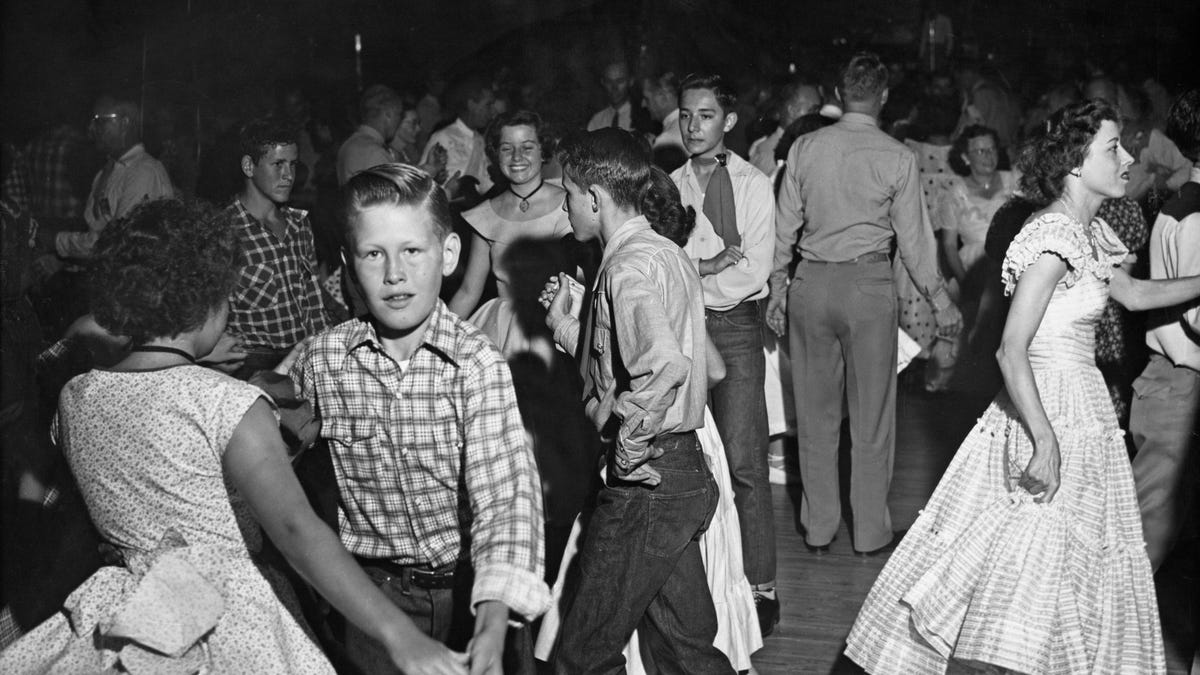I’m not sure if they torture kids like this still, but the worst four-week period of my 6th grade life was our unit on square dancing in gym class. And wouldn’t you know it? One of the worst experiences of my academic life — and possibly yours as well — can be blamed on Henry Ford.
If they stopped subjecting children to this sometime in the late ’90s, allow me to set the scene: It was like some awkward, ritualistic hootenanny filled with the most hopelessly prepubescent-addled bodies leaking face oil and embarrassment at the idea of touching hands and do-si-doing around a member of the opposite sex. I actually made a bet with my 6th grade teacher that I could get out of it, and did so by hiding in the bathroom for the entire period. When he found out he laughed, but made me apologize to the gym teacher. (Hi Mr. Hogan!)
We’ve documented some of Ford’s odder proclivities before. I’m simply fascinated with the man and his affect on society. Here’s a guy who had it all; Thomas Edison’s last breath, the chair Lincoln was murdered in, his own Amazonian colony and his own secret police. But still, Ford craved to leave an even deeper mark on the generations who would succeed him. This cultural shift would come from a dark place, however. From Quartz:
To understand how square dancing became a state-mandated means of celebrating Americana, it’s necessary to go back to Henry Ford, the founder of Ford Motor Vehicles. Ford hated jazz; he hated the Charleston. He also really hated Jewish people, and believed that Jewish people invented jazz as part of a nefarious plot to corrupt the masses and take over the world—a theory that might come as a surprise to the black people who actually did invent it.
In volume three of Ford’s The International Jew series, written in 1921, he writes:
“Many people have wondered whence come the waves upon waves of musical slush that invade decent homes and set the young people of this generation imitating the drivel of morons. Popular music is a Jewish monopoly. Jazz is a Jewish creation. The mush, slush, the sly suggestion, the abandoned sensuousness of sliding notes, are of Jewish origin.”
By bringing back traditional American (white) dance forms, Henry Ford hoped to combat the threat of jazz. But even in Ford’s heyday in the 1920s, square dancing was considered old fashioned. People were drunk in the cabarets listening to morally degrading trumpets and bass, not soberly swinging around each other inside agricultural halls. So Ford promoted the practice the Henry Ford way – by forcing his workers to do it:
In order to bring his dream to life, Ford poured tons of money into square dancing and country music in general. In 1926, he published an instruction manual for aspiring square dancing instructors titled “Good Morning: After a Sleep of Twenty-Five Years, Old-Fashioned Dancing is Being Revived by Mr. and Mrs. Henry Ford.” He also required his employees to attend the square dancing events he created for them, funded fiddling contests and radio shows promoting “old time dancing music,” as well as the creation of square dancing clubs across the US—where modern, Western-style square dancing as we know it now was really created.
[…] Ford saw these dances as intrinsically white, and thus more intrinsically wholesome. Along with his wife and their square dance instructor Benjamin Lovett, he campaigned to bring square dancing to the physical education classes of students across the country, believing it would teach children “social training, courtesy, good citizenship, along with rhythm.” The schools agreed, and by 1928, almost half the schools in America were teaching square dancing and other forms of old-fashioned dancing to students.
This would be like Elon Musk deciding America’s school children all need to learn to do the hustle, despite the dance being solely the providence of drunk aunts at weddings, because it was his personal belief that it would make the kids better Americans. As wild as American oligarch entitlement is today, it was so much more intense less than 100 years ago.
Square dancing was a brief national trend thanks to the Fords, but its flame threatened to sputter out around the Great Depression. Not one to let bad ideas die, however, America was treated to a second square-dancing booster in the form of Lloyd “Pappy” Shaw. Square dancing mania has popped up every few years since, with Ronald Reagan declaring square dancing the national dance in 1982 and 1993. Square dancing’s white supremacist and antisemitic roots in the 20th century, however, has held the folk dance back from being declared America’s national dance.
Square dancing is still with us, of course. Oddly enough, here in Detroit just next door to Ford’s empire of Dearborn, there are multiple square dancing groups focusing on square dancing in Black culture.







